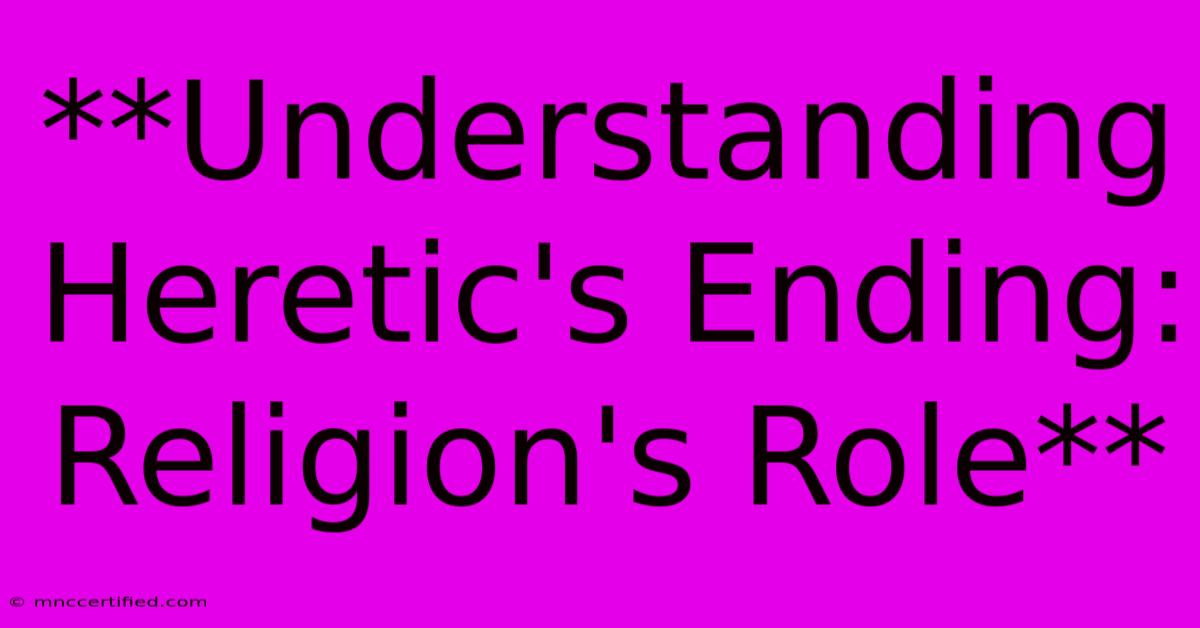**Understanding Heretic's Ending: Religion's Role**

Table of Contents
Understanding Heretic's Ending: Religion's Role
Heretic, a critically acclaimed game from the developers at The Chinese Room, is known for its complex narrative and thought-provoking themes. One of the most discussed elements of the game is its enigmatic ending, which leaves players with more questions than answers. While various interpretations exist, understanding the role of religion in the game's conclusion is crucial to grasping its deeper meaning.
The Significance of the Cult
Throughout the game, players encounter the Cult of the Heretic, a group of individuals dedicated to a mysterious figure known only as the Heretic. This cult believes that "the world is ending" and that the Heretic possesses the key to salvation.
The game's developers have deliberately chosen not to provide a clear explanation for the Cult's beliefs. Instead, players are encouraged to question the validity of their claims and the nature of their faith. This ambiguity is further heightened by the mysterious figure of Father who appears as a recurring character, representing an authority figure within the cult.
The Heretic's Promise
The Heretic, a shadowy figure shrouded in mystery, promises a new beginning, a chance to escape the world's destruction. He encourages his followers to "let go" of their past and embrace a new reality. The Heretic's message resonates with the characters in the game, who are all grappling with personal struggles and anxieties.
The Ending: A Question of Faith
The ending of Heretic leaves players with a crucial question: Does the Heretic offer true salvation, or is he merely a manipulator exploiting people's fears and insecurities?
The game's final scene offers a glimpse of the "new world" created by the Heretic. However, instead of offering a sense of peace and redemption, it portrays a sterile, artificial environment where individuals are stripped of their individuality and forced to conform.
This ending challenges the very notion of faith, leaving players to grapple with the complexities of belief and the dangers of blindly following a charismatic leader.
The Role of Religion in Heretic
Heretic doesn't necessarily endorse or condemn religion. Instead, it uses the narrative of the Cult and the Heretic to explore the complex relationship between faith, belief, and control. The game encourages players to critically examine their own faith systems and the potential dangers of surrendering their autonomy to a higher power.
By leaving the interpretation of the ending open, Heretic compels players to engage in their own personal reflection. It forces them to confront their own anxieties and grapple with questions of meaning and purpose.
Conclusion
Heretic's ending is a powerful testament to the enduring human struggle for meaning and belonging. By employing a complex narrative interwoven with themes of religion and faith, the game invites players to engage in a profound exploration of their own belief systems. The ending, ultimately, offers no easy answers, instead challenging players to form their own conclusions and confront the unsettling implications of blind faith.

Thank you for visiting our website wich cover about **Understanding Heretic's Ending: Religion's Role**. We hope the information provided has been useful to you. Feel free to contact us if you have any questions or need further assistance. See you next time and dont miss to bookmark.
Featured Posts
-
Scherzinger Offers Apology For Brand Comment
Nov 09, 2024
-
San Francisco Mayor Elect Luries Victory Speech Plans
Nov 09, 2024
-
Covalent And Ionic Bonding Quick Check
Nov 09, 2024
-
Heretic Movie Ending Director Insights
Nov 09, 2024
-
Greenwich Bay Trading Company Hand Soap
Nov 09, 2024